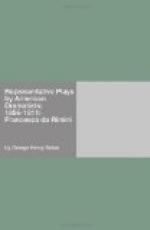An examination of the cast in the Davenport program with the cast as it was when Boker issued the play, indicates that the text must have been considerably changed, and certain characters omitted, when, at the suggestion of Winter, Lawrence Barrett promised to revive it during the summer of 1882. The scholarly turn of Barrett’s mind must have made him ponder it well during a trip he made abroad at the time, and Boker, meanwhile, must have been cutting the cloth to suit the actor’s ideas. Barron, one of Barrett’s biographers, claims that “Mr. Barrett saw great possibilities in the work, and with his practical assistance the play was suitably changed, new situations were effected, a more picturesque colouring was given the scenes and story, and all that was repellant in the too close following of Dante [!] was removed.” The play was given by Barrett, at Haverly’s Theatre, Chicago, on September 14, 1882, Otis Skinner playing Paolo, and Marie Wainwright appearing as Francesca. In Winter’s estimate of the performance, we find the dominant characteristics being “moderation” and “balanced growth.” He says of Lanciotto: “Alertness of the brain sustained it, at every point, in brilliant vigour, and it rose in power, and expanded in terrible beauty, accordingly as it was wrought upon by the pressure of circumstances and the conflict of passions.”
The memory of this must have affected the interpretation of Mr. Skinner, when, as Lanciotto, in his revival of the piece at the Chicago Grand Opera House, August 22, 1901, with Aubrey Boucicault as Paolo, Marcia Van Dresser as Francesca, and William Norris as Pepe, he met with such success. “D’Annunzio gives us the soldier and the brute,” he wrote me in 1904. “Boker’s hero is an idealist—almost a dreamer.” The fact is, Boker was recalling his memories of Othello and Richard III, if not of Hamlet, as Skinner suggests. In another respect did the Barrett performance affect the later revival. The portrayal of Pepe, by Norris, was based on what he called “the James tradition,” Louis James having, as Winter wrote, “a laughter that is more terrible than malice.”
Lawrence Barrett’s interest in the American drama was never very pronounced. He sought Boker’s “Francesca da Rimini,” as he sought W.D. Howells’ “Yorick’s Love” (given at Cleveland, Ohio, October 26, 1878), because the roles therein suited his temperament. Between him and Boker, there was some misunderstanding of short duration, about royalties, but this was bridged over, and Boker’s final attempts at playwriting were made for him. The reader is referred to Vol. 32, n.s. Vol. XXV, no. 2, June, 1917, of the Publications of the Modern Language Association of America, for statements as to Boker’s “profits” from the stage.
After Otis Skinner’s revival of “Francesca da Rimini,” it was played for a while by Frederick Ward and Louis James in association (1893) and by Frank C. Bangs in 1892.




